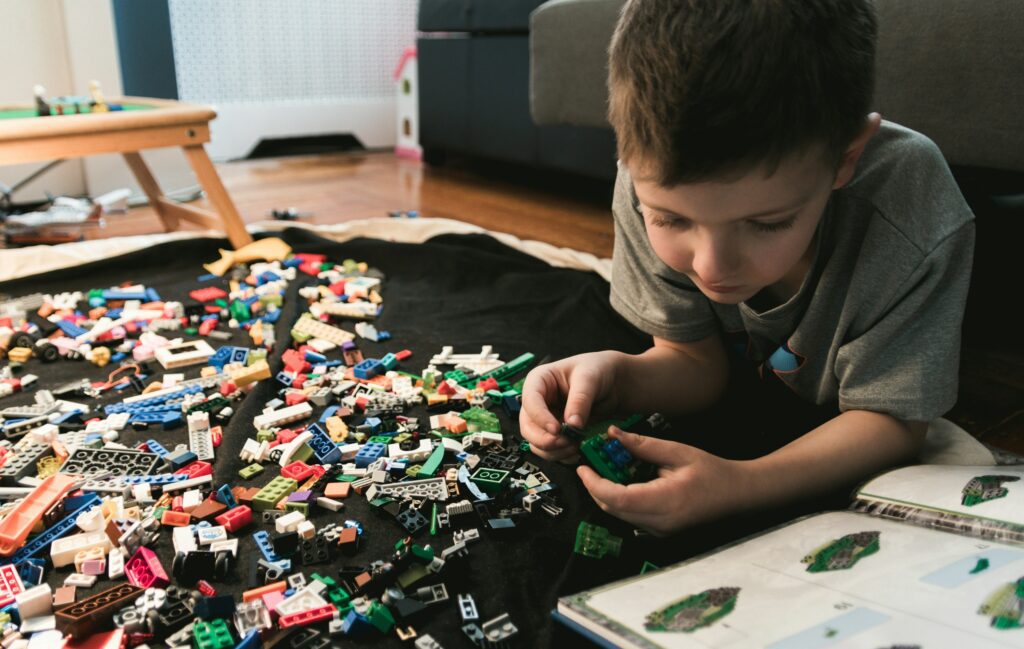The way a child thinks plays a significant role in shaping their future, including their career path and how they navigate the world around them. Some children are more spontaneous, while others are contemplative. Some think creatively, while others excel in logical, structured thinking. Understanding your child’s cognitive style is essential to supporting their growth, helping them develop their strengths, and guiding them toward success.
At KidProsper, we recognize the importance of cognitive diversity, which is why we assess four distinct cognitive styles: Contemplative Thinking, Spontaneous Thinking, Creative Thinking, and Logical Thinking. Each of these cognitive styles contributes uniquely to a child’s development, and none is more important than the others. By identifying your child’s cognitive style, you can better understand how they approach problems, make decisions, and interact with the world, which in turn allows you to nurture their potential.
What Are Cognitive Styles?
Cognitive styles refer to the different ways in which individuals process information and approach thinking. These styles influence how children solve problems, absorb new knowledge, and express themselves. Every child is unique in their thought process, and by understanding these preferences, parents and educators can provide the support and tools that align with the child’s natural way of thinking.
KidProsper’s Cognitive Styles test helps to assess which style best fits your child. The four cognitive styles we examine—Contemplative, Spontaneous, Creative, and Logical—are all valuable in different ways. Whether your child is more reflective and deliberate or quick and intuitive in their thinking, understanding their cognitive style is key to unlocking their potential and guiding them toward success.
1. Contemplative Thinking
Children with a contemplative thinking style are reflective and thoughtful. They prefer to take their time when approaching a task or problem, carefully considering all options before making a decision. These children are often deep thinkers who enjoy pondering questions and exploring ideas in depth. Contemplative thinkers are patient, thorough, and prefer to avoid rushing into decisions. They often excel in situations that require analysis, introspection, and long-term planning.
How to Support a Contemplative Thinker:
- Give Them Time to Reflect: Avoid rushing your child when they are faced with a decision or problem. Allow them the space to think things through and weigh their options carefully.
- Encourage Journaling and Reflection: Contemplative thinkers often benefit from reflecting on their thoughts and experiences. Encourage them to keep a journal where they can explore their ideas and feelings in a structured way.
- Provide Open-Ended Questions: Challenge your child with questions that require deeper thinking and exploration of different perspectives. This allows them to engage in the kind of thoughtful, reflective analysis they enjoy.
- Long-Term Projects: Contemplative thinkers excel at tasks that require ongoing analysis and development. Encourage them to pursue long-term projects that allow for thoughtful planning and slow, steady progress.
2. Spontaneous Thinking
Children with a spontaneous thinking style are quick decision-makers who rely on intuition and instinct. They enjoy thinking on their feet, often excelling in dynamic environments where they can act quickly and adapt to changing situations. Spontaneous thinkers are energetic, flexible, and open to taking risks. They thrive in fast-paced, unpredictable settings and often come up with creative solutions in the moment.
How to Support a Spontaneous Thinker:
- Encourage Quick Problem Solving: Provide opportunities for your child to make quick decisions and think on their feet. Games, puzzles, or activities that require immediate responses can help develop their instinctual thinking.
- Allow Flexibility: Spontaneous thinkers often prefer variety and adaptability in their learning environment. Avoid rigid schedules or strict routines, and instead, allow room for exploration and experimentation.
- Promote Creativity in Action: Encourage activities where your child can act quickly and express themselves, such as improvisational games, storytelling, or hands-on art projects. This helps them tap into their natural spontaneity.
- Support Risk-Taking: Spontaneous thinkers are more likely to take risks and try new things. Provide a safe space for them to experiment with ideas, even if it means occasional failure. This will help them grow and learn from their experiences.
3. Creative Thinking
Children with a creative thinking style are imaginative and enjoy approaching problems from new and unconventional angles. They tend to think outside the box and are skilled at generating original ideas and solutions. Creative thinkers often see connections between ideas that others may overlook, and they excel in tasks that require innovation, artistic expression, and divergent thinking. These children are often drawn to activities like art, writing, music, or design, where they can express their unique perspectives.
How to Support a Creative Thinker:
- Encourage Artistic Expression: Provide opportunities for your child to explore different forms of creative expression, whether through painting, drawing, writing, or music. Creative thinkers thrive when they can experiment with new ideas in a free-form way.
- Promote Brainstorming and Idea Generation: Creative thinkers excel when they are free to brainstorm and come up with new ideas. Encourage your child to think about different solutions to problems and explore unconventional methods.
- Support Open-Ended Projects: Creative thinkers often enjoy projects that allow for a variety of approaches and outcomes. Give your child the freedom to take a project in their own direction, rather than sticking to a rigid plan.
- Foster Curiosity: Creative thinkers are naturally curious about the world around them. Encourage your child to ask questions, explore new topics, and engage in activities that spark their imagination.
4. Logical Thinking
Children with a logical thinking style are methodical and enjoy analyzing problems in a structured, rational way. These children excel at breaking down complex information into smaller, manageable parts and prefer to rely on reason, facts, and evidence when making decisions. Logical thinkers tend to be systematic and organized, often preferring activities that involve numbers, patterns, or solving puzzles. They are detail-oriented and thrive in environments that require critical thinking and problem-solving.
How to Support a Logical Thinker:
- Introduce Problem-Solving Activities: Logical thinkers love puzzles, strategy games, and challenges that require analytical thinking. Encourage them to engage in activities that require logic and reasoning, such as math problems, coding, or chess.
- Encourage Structured Thinking: Provide opportunities for your child to organize their thoughts and solve problems in a step-by-step manner. Teaching them how to create lists, charts, or outlines can help them approach tasks more effectively.
- Offer Opportunities for Debate: Logical thinkers enjoy analyzing and discussing different viewpoints. Engage your child in debates or discussions where they can use facts and logic to make their points and understand different perspectives.
- Support Scientific Exploration: Many logical thinkers are drawn to science and experiments. Encourage your child to explore science-based activities or conduct experiments where they can test hypotheses and draw conclusions based on evidence.
Why All Cognitive Styles Are Important
At KidProsper, we believe that no single cognitive style is better than another. Each style—Contemplative, Spontaneous, Creative, and Logical—plays a critical role in a child’s overall development. Children who are spontaneous thinkers might excel in dynamic, fast-paced environments, while contemplative thinkers thrive in areas that require deep analysis and careful thought. Likewise, creative thinkers bring innovation and originality, while logical thinkers provide structure and clarity.
By understanding your child’s cognitive style, you can:
- Tailor Learning Experiences: Create learning opportunities that align with how your child naturally processes information, whether that’s through hands-on problem-solving, creative expression, or thoughtful reflection.
- Support Their Strengths: Foster your child’s natural strengths by encouraging activities that resonate with their cognitive style, helping them grow in confidence and ability.
- Help Them Overcome Challenges: Recognize potential challenges that may arise due to their cognitive style and provide the right support to help them navigate these difficulties successfully.
How KidProsper Can Help Identify Your Child’s Cognitive Style
The KidProsper app offers an easy and insightful way to assess your child’s cognitive style through our “Cognitive Styles” test. This test provides valuable insights into how your child thinks and approaches learning, helping you better support their development.
With KidProsper, you can:
- Understand Your Child’s Thinking Style: Identify whether your child is more contemplative, spontaneous, creative, or logical in their thinking, and use this information to tailor your support.
- Get Personalized Recommendations: Receive customized advice on how to nurture your child’s cognitive style and provide activities that align with their strengths.
- Track Progress Over Time: Monitor how your child’s cognitive style evolves as they grow, allowing you to adjust your approach as needed.
Conclusion: Helping Your Child Succeed with KidProsper
Understanding your child’s cognitive style is the key to unlocking their full potential. At KidProsper, we believe that all cognitive styles are important and contribute to a child’s success. Whether your child is a contemplative thinker who enjoys deep reflection, a spontaneous thinker who thrives on quick decisions, a creative thinker who loves innovation, or a logical thinker who prefers structure and reason, each cognitive style brings unique strengths to the table.
By identifying and nurturing your child’s cognitive style with KidProsper, you can provide the tools they need to excel in school, future careers, and life. Discover your child’s cognitive style today with KidProsper, and help them thrive!



